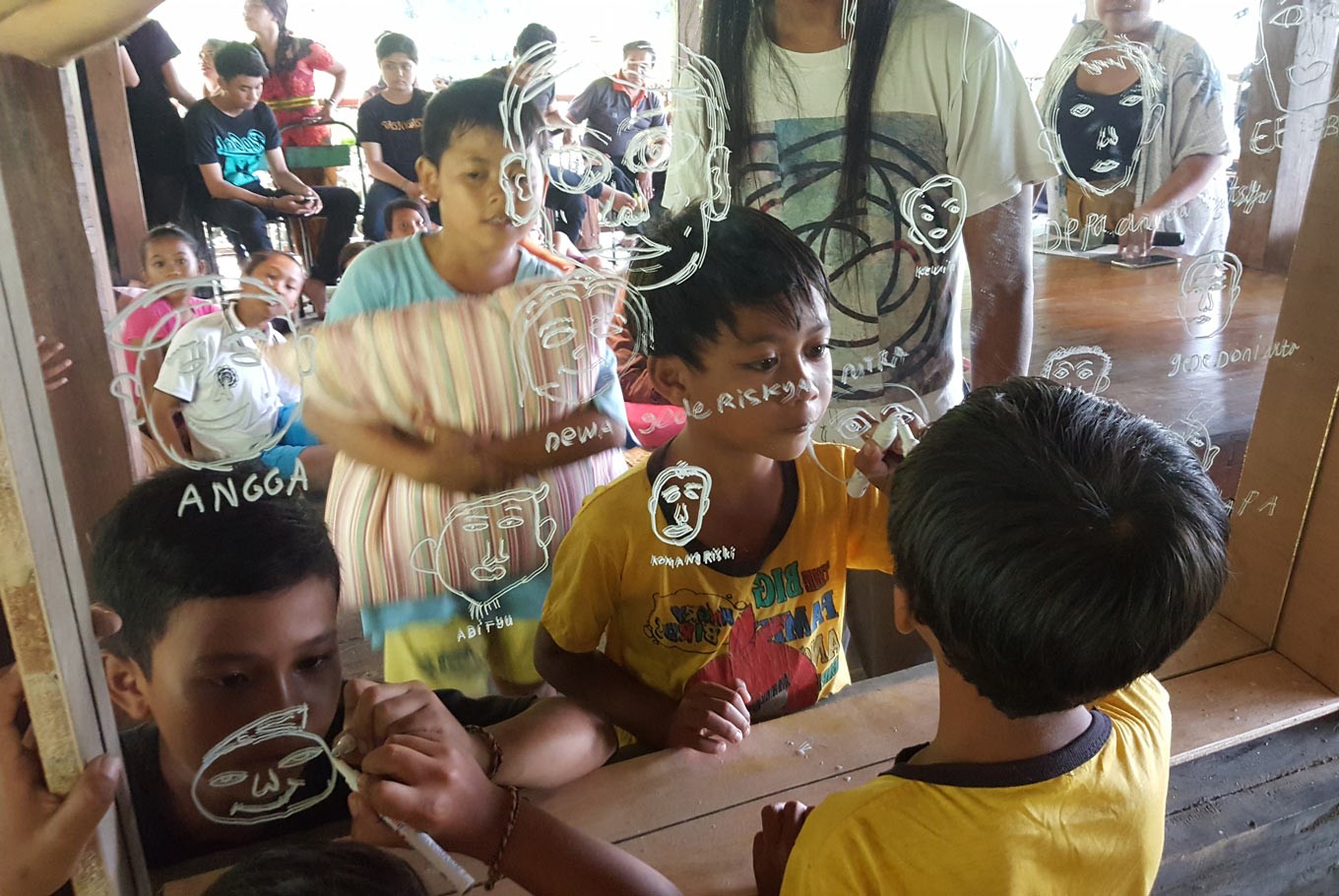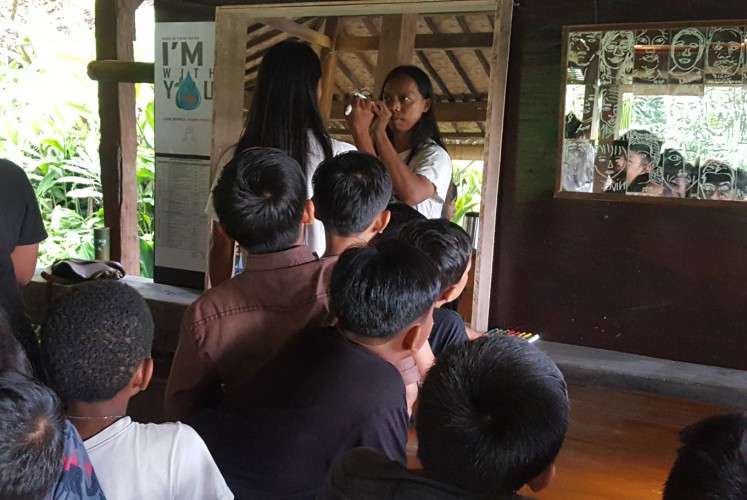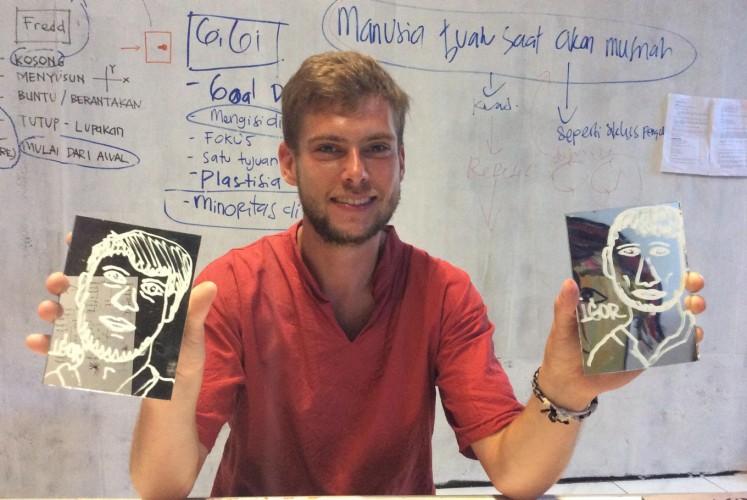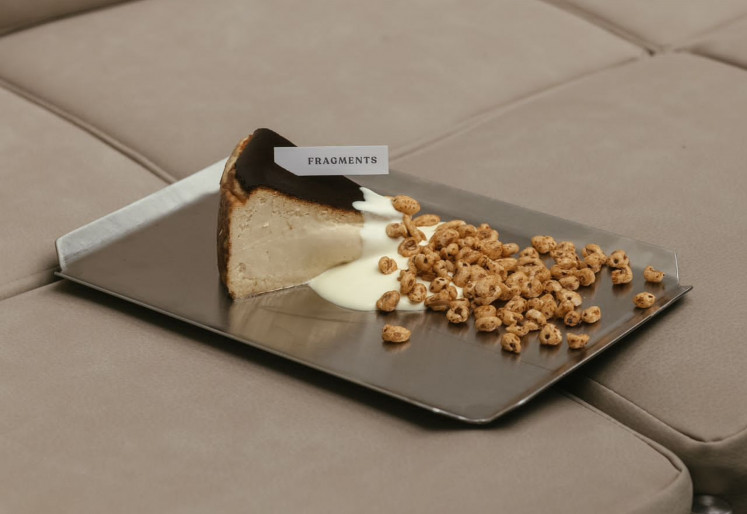Popular Reads
Top Results
Can't find what you're looking for?
View all search resultsPopular Reads
Top Results
Can't find what you're looking for?
View all search resultsArt project explores the selfie phenomenon
In his on-going venture in community engagement beginning early this year, Kenyut randomly seeks out people and asks them to be participants by drawing their image onto a small piece of mirror with a marker pen.
Change text size
Gift Premium Articles
to Anyone
W
e are living in the era of pop-culture selfie-mania. Technology and smartphones have democratized visual self-expression, with social media and imaging apps allowing us to constantly “curate” our digital presence, enhancing our obsession with our perfect self.
The Century of The Self, the landmark 2002 documentary series by British filmmaker Adam Curtis, focuses on the work of Austrian psychoanalysts Sigmund Freud, his daughter Anna and his American nephew Edward Bernays. Freud was responsible for changing our perception of the mind and its workings.
A devotee of his uncle’s work, Bernays was the first to use psychological techniques in a new field of marketing he labelled Public Relations. He went on to establish a hugely influential PR consultancy in New York City in the 1920s that was to have an unprecedented impact on western civilization.
"This series is about how those in power have used Freud's theories to try and control the dangerous crowd in an age of mass democracy,” Curtis says in his introduction to “Episode One.”
“Bernays showed corporations how they can make people want things they didn’t need by linking mass produced goods to their inner desires. By satisfying one’s inner selfish desires people became happy and docile. This was the start of the all-consuming self, which has come to dominate the world today.”
Read also: Art Stage Jakarta returns with more participants, special projects
In recent years the selfie has entered the sphere of social themes for Indonesian contemporary artists. During Jogja Art Weeks (JAW), a month-long plethora of art activities held through the months of May-June in Yogyakarta, there were two presentations based on this theme. In Selfie Frame, collective showings by Indonesian and Polish artists, decorated frames were arranged throughout an exhibition space and visitors were invited to pose within them, and then post their selfies onto social media.
Popular young artist Oky Rey Montha exhibited In Frame We Trust at ArtJog10. He prompted the audience to engage with his installation by sitting on a toilet and taking a selfie in front of his paintings that parodied the selfie as a ridiculous act. The artists contributed nothing fresh to the critical discourse about this phenomenon, prioritizing fun experiences while appearing to utilize the opportunity simply as an attempt to “cash in.”
East Javanese, Bali-based artist Djunaidi Kenyut during his presentation to children participant in 'I Love Me – the Selfie Project' at Tepi Sawah Festival. (JP/Richard Horstman)East Javanese, Bali-based artist Djunaidi Kenyut, however, takes a vastly different approach with his art project, I love Me – the Selfie Project. In his on-going venture in community engagement beginning early this year, Kenyut randomly seeks out people and asks them to be participants by drawing their image onto a small piece of mirror with a marker pen. He later engraves the image permanently onto the glass.
“People without artistic experiences often feel intimidated when I ask them to partake,” Kenyut said. “So, I introduce this exercise to them in a fun, non-confrontational way with the theme ‘drawing is easy.’”
The artist’s goal is to amass 2,000 of these individual images and exhibit them in Surabaya, East Java, along with presenting a workshop to children at the school he attended in the city during his childhood.
From April 29, for one month, Kenyut exhibited over 200 of these self-portraits in I Love Me – the Selfie Project, at Laramona, Ubud, Bali. Featuring an array of fascinating, often humorous manually recorded images, the exhibition opening was a unique gathering where the project participants’ creations were the focus of interest.
Read also: Reviving Panji tales in arts and culture
Kenyut continued his engagement with the public at the Tepi Sawah Festival in Pejeng, Ubud, on June 3-4, a new grassroots community celebration of music, performance and creativity, highlighted by children’s educational programs on topics including environmental awareness and sustainability. Here he presented a workshop to children introducing the concept of contemporary art and involving them in The Selfie Project. The group of 20 boys and girls delighted in the opportunity to participate in a communal work by drawing their reflections on a large mirror.
During his one-on-one interactions, Kenyut learns about the character of the participants.
“For some, the task of drawing their reflection is easy, while for others, it’s difficult because they are afraid of their self-appearance,” he said. “In the mirror, they tend to see one of two things, and then chose to either imitate their true reflection or create an ideal image of the self. Some people focus on the creative process, while others focus on the results.”
“When people become hesitant, I encourage them, and if they are not happy with the result, it can be erased and they can try again,” he said.
During this process, Kenyut carefully prompts them to look into the mirror and engage with their reflection, to look beyond the physical, and to love and accept who they are. This helps to stimulate their creative process.
“Simulating one’s self-image evokes a sense of self-confidence,” Kenyut said.
“I believe selfies to be narcissistic behavior — a desire to love one’s self excessively. The addiction we witness on social media is an empty expression constantly being repeated, reflecting people’s unbalanced psychological state. The selfie addicts look happy, but on the inside, they are not,” Kenyut said.
What effect is this addiction having upon our society? Has the selfie reduced life to a popularity contest, driven by the external myth of beauty and the need to compare ourselves with others, governed by likes, Instagram followers and Facebook friends?
The ancient Egyptians understood the relevance of distinguishing and connecting with the self. Within the inner sanctum of the Luxor Temple on the east bank of the Nile River, a proverb states, "Man, know thyself, and you are going to know the gods.”
I Love Me – the Selfie Project encourages people to reflect upon their inner worlds. This, Kenyut believes, is the key to the most powerful door of all.
Contemporary artists increasingly play essential roles within the positive development of modern society. They challenge our understanding of ourselves, help others to see things differently and to learn about the world. Importantly, they shine light on issues that need to be individually and collectively addressed for the sake of a sustainable, more peaceful and loving world.
---------------
Interested in writing for thejakartapost.com? We are looking for information and opinions from experts in a variety of fields or others with appropriate writing skills. The content must be original on the following topics: lifestyle ( beauty, fashion, food ), entertainment, science & technology, health, parenting, social media, and sports. Send your piece to community@jakpost.com. Click here for more information.













